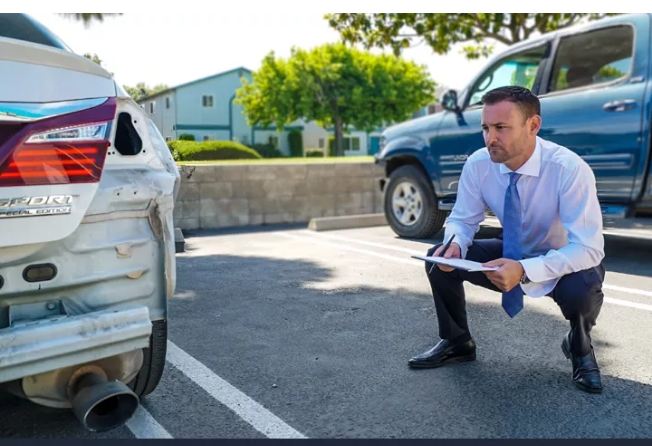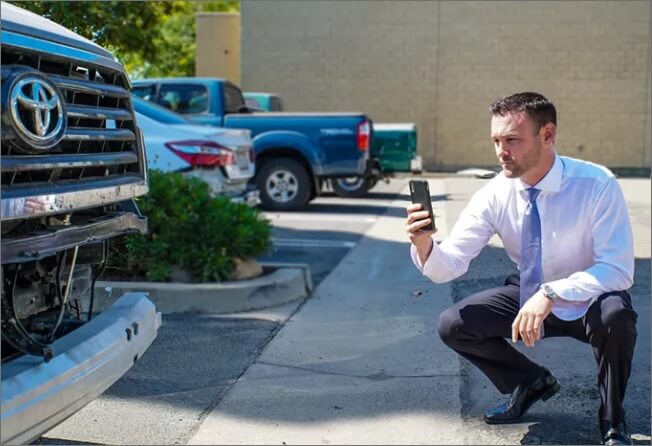25+ YEARS OF EXPERIENCE
99% WIN RATE
NO UPFRONT FEES
If you were injured during a traumatic car accident, contact a top-rated California car accident lawyer at (866) 622-6491 urgently. Our team of award-winning auto accident attorneys is here to ensure your car accident personal injury claim is handled effectively.
It all starts with a free consultation. We’ll go over the details of your accident, determine the viability of your case, get you seen by an experienced doctor, and provide you with valuable advice regarding the next steps you should take — all at no cost to you.
Support from our experienced car accident attorneys ensures you get the highest settlement possible by avoiding common pitfalls — like not getting seen by a doctor and failing to communicate all of the important details about your car accident to your insurance company representing you or the other party involved in the crash. Our California personal injury lawyers work on a contingency fee basis. This means our representation is available to you with zero upfront fees.
Most of the cases we take on settle out of court, giving our clients a much faster resolution to their case. This eliminates the stress that can be caused by a drawn-out court battle. This allows our clients to focus on getting back to their normal lives.
We’re able to achieve such efficient results because of our hands-on approach and attention to detail. Each case is personal to us. We take pride in going above and beyond to handle all of your family’s needs during this difficult time.

If I ever need a lawyer again, I’m calling the May Firm. I was rear ended and had a ton of bills. They told me what my rights were and that they would take care of me. All I had to do was get to physical therapy. They did everything, and I ended up with a very nice settlement and a new car. Thank you! You exceeded my expectations!
AMANDA ALLEN
Car Accident
“A friendly and professional firm. Always answered questions quickly. Highly recommended to anyone who needs a personal injury lawyer. Extremely satisfied with the outcome.”
linda hughes
Car Accident
Natalie Garcia
Bicycle Accident









Despite what they may claim, both your insurance company as well as the insurance of the other party involved will attempt to settle your claim for the lowest dollar amount possible.
We at the May Firm know a car accident can affect much more than the vehicle you drive. Medical bills, missed work, caring for dependents, and emotional suffering all add up just as quickly as the repair bill from your mechanic. We’re committed to getting you the highest settlement we can to help cover all these peripheral costs, and we won’t accept payment unless a case is won.
National Highway Traffic Safety Administration research shows that 1.7 million Americans reported being involved in injury-related auto accidents in 2015 alone. Even the most careful motorists can find themselves caught in a collision. With motor vehicles being the primary mode of transport for most Americans, the risk of a crash is an ever-present possibility.
Despite this, many drivers are unaware of what steps to take if they find themselves involved in a collision. The California car accident lawyers at the May Firm are here to help. In the event of a crash, our expert team will guide you through the legal process from start to finish to ensure you have a timely personal and financial recovery so you can get back on the road.

No matter what type of car accident you were involved in, our California car accident lawyers can help. We believe every car accident victim has the right to be represented by a top-rated California motor vehicle accident attorney. We have won large settlements for the victims we’ve represented because we dig beneath the surface to discover the facts of your case.
By examining police records, talking to witnesses, and re-creating the scene of the accident, the top-rated California car accident lawyers at the May Firm equip themselves with the information they need to serve as your best advocate. We’ll act as your liaison with doctors, insurance companies, and the police so you can focus on getting the proper medical care.
Oftentimes injuries may not be immediately apparent. Therefore it is incredibly important that you are examined by a doctor with the medical background and experience to recognize your existing and potential medical complications resulting from your car accident.
The popularity of smartphones has put a recent emphasis on the dangers of distracted driving. Distraction.gov, the “Official U.S. Government Website for Distracted Driving,” reports that at any given time, 660,000 motorists are using cellphones or other portable electronics while driving.
Driver distractions accounted for 431,000 injuries and 3,179 deaths in 2014 alone. The website also lists other prominent distractions (i.e., eating or drinking, grooming, reading maps, or adjusting the radio). Drivers should make every attempt to minimize distractions. If you were involved in an accident because of the negligence of a distracted driver, give us a call at (866) 622-6491 for a free consultation.

“If you or a loved one has been injured following a car accident, we are here to help. You focus on getting better; we’ll handle the rest.”
As previously mentioned, injuries may not be readily apparent at the time of the accident. Common car accident injuries include bruising, lacerations, bone breaks, and sprains. It’s extremely important to get medical attention after a crash.
At a minimum, a healthcare professional can help establish a baseline of how you feel should injuries reveal themselves or your condition worsens in the following days. Injuries to the head or spinal cord may be less apparent initially but can cause serious health complications down the line. Documentation that you sought out medical care following an accident can greatly help your case and ensure that you aren’t left holding the bill, trying to cover expensive medical treatment for your injuries.
“Rob May and his team achieved over and above what I ever anticipated. I am thankful I found them, and I hold them in the highest esteem. Should you ever need a conscientious and diligent personal injury lawyer, I strongly recommend Robert May. He’s awesome. Thanks, guys, for your patience and professionalism. You rock!”
JEANNE MELLO
Dog Bite & Attack
In 2015 alone, the National Highway Traffic Safety Administration (NHTSA) reported 10,265 fatalities as a result of drunk driving. If you are the survivor of a collision with a drunk driver, get in touch with our car accident team to see if we can help you get your life back on track. We work with a proven team of local medical experts to ensure your recovery process goes as smoothly as possible while we go to work to get you the maximum compensation we can for damages and medical bills.
Car accidents are frightening and sometimes overwhelming experiences. Your priority is ensuring that you and others at the scene are safe.
Don’t feel compelled to admit liability and move away from the other driver if there’s a chance they could turn hostile or aggressive. Seek legal help as soon as possible from a car accident lawyer in CA.
With the combination of adrenaline spiking and the emotional stress of an accident, it’s easy to get caught up recounting details of the event to whomever is present and willing to lend an ear. You should always cooperate with local authorities and law enforcement, but do your best to keep your details as objective as possible.
Things you say may be misconstrued or taken out of context, twisted in a way that may show you as being more at fault than you really were. Establishing fault is critical to any case. Even if you are confident the accident was not your fault, do not go out of your way to accuse the other party. Leave that aspect of the case for your legal team to handle.

“If you were in a motor vehicle accident, it is your responsibility to seek legal counsel and refer aggressive or inappropriate questions to your attorney. Answer questions directly and objectively. Resist the urge to provide additional details. Your legal team will help you communicate the facts of your accident correctly.”
ROBERT MAY
Attorney | Founder
After being involved in a car accident, the very first thing that you should do is seek medical care. Your health is the most important thing – everything else is secondary.
Even if you don’t feel like you’ve suffered any injuries, it is important that you go to the hospital and allow medical staff to check you out. Some injuries, like brain and spinal cord injuries, are not always immediately apparent. Brain and spinal cord injuries can get worse and they cause serious issues down the line if not treated properly. Take care of yourself!
After you’ve been seen by a doctor, take some time to write down everything that you can remember about your car accident. These details can be very helpful to your California car accident attorney.
Memory fades over time and you won’t remember your accident in as much detail six months or a year later. Document your side of the story and everything that you remember while your memory is still clear.
If your accident was caused by someone else, you should contact a personal injury attorney as soon as possible. Navigating a personal injury claim in the legal system can be daunting and there’s no reason to add more stress to your plate than necessary. The experienced lawyers at The May Firm will take on the person who injured you in court while you focus on your recovery.
When you search for “car accident lawyers near me, free consultation”, you might be unsure who to call. The California accident attorneys at The May Law Firm have a 99% success rate and have secured over 150 million dollars in damages for our clients – don’t hesitate to call us to arrange a free case evaluation.
Whatever you do, don’t talk to insurance companies after you’ve been involved in an auto accident. Insurance companies – including your own – are not your allies. They are not on your side. Insurance companies will twist your words in whatever way they need to to avoid compensating you for your injuries, the disruption to your life and expensive medical treatment.
Instead, call a car accident lawyer in CA right away.
If you were involved in a car accident that someone else caused, he or she may be responsible for paying your medical bills. If you didn’t cause the accident, there is no reason for you to be crushed by a mountain of medical debt.
Those who have been involved in car accidents often miss work. Doctor appointments are usually scheduled during business hours and can conflict with your usual work schedule. If you have suffered serious injuries, you may be too hurt to work. In a personal injury suit, you may be able to recover the wages that you missed out on as a result of your injuries.
Being injured, especially in a car accident, can mean serious pain and suffering. If you were hurt in an auto accident, you may be entitled to damages specifically because you suffered pain. These types of damages should be discussed with an attorney.
Have you ever searched for “accident lawyers near me, free consultation?” If so, we understand. When you think of filing an accident claim, you might be unsure how much it will cost and if you can afford the lawsuit. And if you represent yourself, you will be expected to pay all court costs yourself – which could total thousands of dollars.
The May Firm, however, operates on a contingency basis. We cover the costs of your lawsuit and we’re not reimbursed unless we win your case.
If your case is successful, we typically take an industry standard percentage of the settlement – which is a regular practice for personal injury lawyers.
The cost of a personal injury lawsuit for an auto accident varies depending on multiple factors, such as the extent of your injuries. Your first step should be scheduling a free consultation with the experienced car accident attorneys at The May Firm. We can give you answers to your important questions with zero obligation or upfront cost.
There are many factors involved in determining who was responsible for an accident. Even if you think you may be partly to blame, don’t accept fault. You may still be entitled to compensation for your injuries.
California uses a comparative fault system to allocate liability in a personal injury case. Under this system, you are responsible for your own portion of the fault. For example, if you are 30% at fault for the accident and a jury awards $1,000,000 in damages, you are still entitled to $700,000 of that award.
California requires insurance companies to offer uninsured motorist coverage, which is designed to protect you in the event that you are injured by an uninsured or underinsured driver. You have to sign a waiver to decline this coverage so if you haven’t signed a waiver, you likely have this coverage.
These types of claims should be filed quickly as you must prove the other driver was uninsured and at fault. Our California car accident lawyers can help with uninsured driver claims.
It depends.
Many personal injury claims settle out of court. However, if the other side is unwilling to agree to an appropriate settlement amount, you may have no choice but to take your case to trial. If that happens, The May Firm will guide you every step of the way.
If you’ve been in a car accident, you deserve diligent, compassionate representation from lawyers who understand how to get you the care and financial compensation you deserve. At The May Firm, our auto accident attorneys in California can help. We will give you the comprehensive support you need – at no out-of-pocket cost to you.
Call or text for a free consultation at (844) May Firm. As a family-run business, The May Firm Injury Lawyers understand how damaging a setback a car crash can be, and we want to help. We know the complications that pile up in the wake of an auto accident can quickly feel overwhelming. Let us give you the assistance you need to get back on your feet, and back on the road.


GET ANSWERS AND PEACE OF MIND NOW:
Tell us what happened (866) 619-6704
California Personal Injury Lawyers
WE SERVICE ALL OF CALIFORNIA